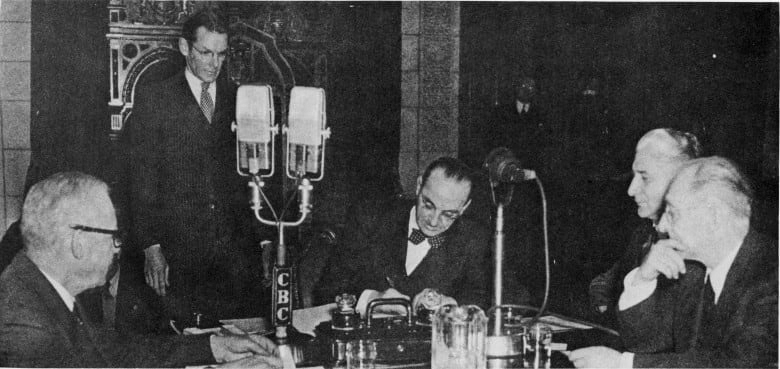We were the last to join the party, and not everyone wanted to join. A narrow majority – 52 per cent – voted to become the 10th province of Canada. On April 1, Newfoundlanders woke up as Canadians and Joey Smallwood declared himself the Father of Confederation
=====
That Confederation is still a hot topic should surprise no one with roots to this province. It’s a topic sung about in popular music, like Great Big Sea’s hit Clearest Indication which has the eloquent words:
“Did we have all we wanted
And let it slip away in time?
Like a country divided
Fifty one to forty nine.”
Don’t tell the Newfoundlanders
 There’s books written on the topic as well, including Greg Malone’s book, Don’t Tell the Newfoundlanders, The True Story of Newfoundland’s Confederation with Canada.
There’s books written on the topic as well, including Greg Malone’s book, Don’t Tell the Newfoundlanders, The True Story of Newfoundland’s Confederation with Canada.
CODCO founder Malone, who emphatically believes Newfoundland got a raw deal by agreeing to join Canada on the eve of April Fool’s day over seven decades ago says, “I carry a Canadian passport because Newfoundland was occupied by Canada in 1949 by means of a constitutional coup arranged with Great Britain.”
Perhaps the date had something to do with the fact that Confederation in this province was looked upon with suspicion, though Canada as a whole certainly took our place amongst them seriously, or so it seemed at the time.
Peace tower marker
On April 1, 1949, then Prime Minister Louis St. Laurent sliced the first ceremonial chisel marks onto a blank stone plaque that had been erected over the entrance to the Peace Tower to acknowledge the fact that at 11:59 the previous night, Newfoundland had become a Canadian province.
Accompanying the prime minister was Newfoundlander F. Gordon Bradley who had just been sworn in as a member of the Canadian Cabinet. “We are all Canadians now,” Bradley is reported to have said, as captured in the Canadian Encyclopedia.
‘The Herald’s’ place
 There always seemed to be a side to pick in the Confederation debate; the pro-Canada Confederates, led by Bradley and Joey Smallwood, a coalition favouring the return of self-government, which included Peter Cashin, and Chesley Crosbie and Geoff Stirling who were but two supporters of an economic union with the United States.
There always seemed to be a side to pick in the Confederation debate; the pro-Canada Confederates, led by Bradley and Joey Smallwood, a coalition favouring the return of self-government, which included Peter Cashin, and Chesley Crosbie and Geoff Stirling who were but two supporters of an economic union with the United States.
The Herald, with three years under its publishing belt before the passing of Confederation, has a unique place in this province’s history.
Founder Geoff Stirling, as a supporter of an economic union with the U.S. and as a publisher, was able to reach the masses with his message, and, as can be attested to from our archives, he endeavoured to do just that.
From the pages of The Herald and the pen of Geoff Stirling, published Jan. 4, 1948, under the headline: Confederates Scared to Death of Nfld. Pro-American Sentiment;
“It seems that although the Confederate masterminds in this country are not unduly worried about the Responsible Government sentiment or even Commission of Government sentiment, they are frightened out of their wits about the tremendous pro-American sentiment which is evident in this country.
Selling the country
“It is expected because of this, a few of their louder mouths will soon make a hypocritical attack on any and all persons who have shown any public support of this sentiment. The prospect of this rather ridiculous attack is being awaited with amusement, and is likely to be the start of a hot political campaign, destined to continue right up until the general elections in May. Many wonder what kind of double talk the Confederates will use, in saying on the one hand that American Union would be selling the country, while on the other hand they are trying to make a deal with Ottawa.”
The Herald’s archives not only provide a look at the politics of the time, but also provides a glimpse at what Newfoundlanders were thinking. Published days before the first referendum, Stirling reported: “At least one taxi driver has no intention of getting mixed up in politics. Having recently returned from a nearby outport, when asked by a local politician how the sentiment was he replied, ‘They are all solid.’ The politician asked, ‘Solid for what?’ to which the taximan replied, ‘Solid for whatever you want.’”
Of course, we all know the outcome of all the debate was Confederation, thanks largely to the efforts of one man, Joesph R. Smallwood, who became the province’s first Canadian premier in 1949 and remained in office for 22 years. Known to be strong-willed and brisk at times, as a communicator, anyone who met or heard the man speak would agree he left a lasting impression and made a powerful impact.
The never-shy Smallwood – who dubbed himself the last living father of Confederation – had this to say when asked his greatest legacy; “Of course I would have to declare instantly and emphatically, if I were asked for my own opinion of the biggest achievement of my public life: Confederation; my part in introducing the issue and my effort in helping to bring it about.”
We would have to agree.
